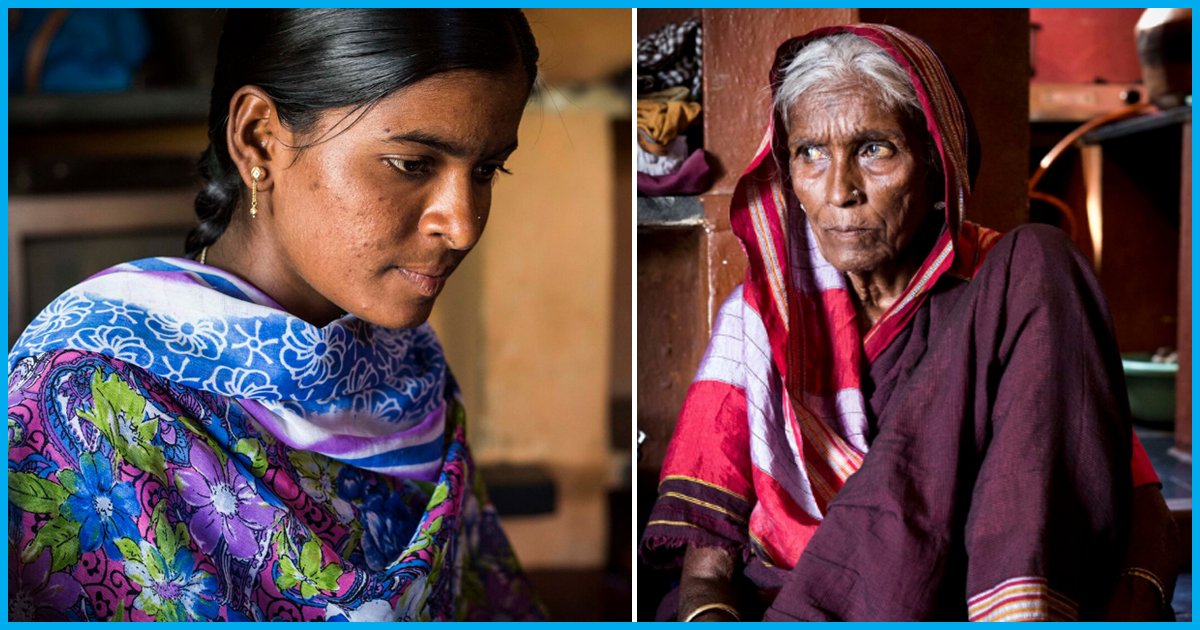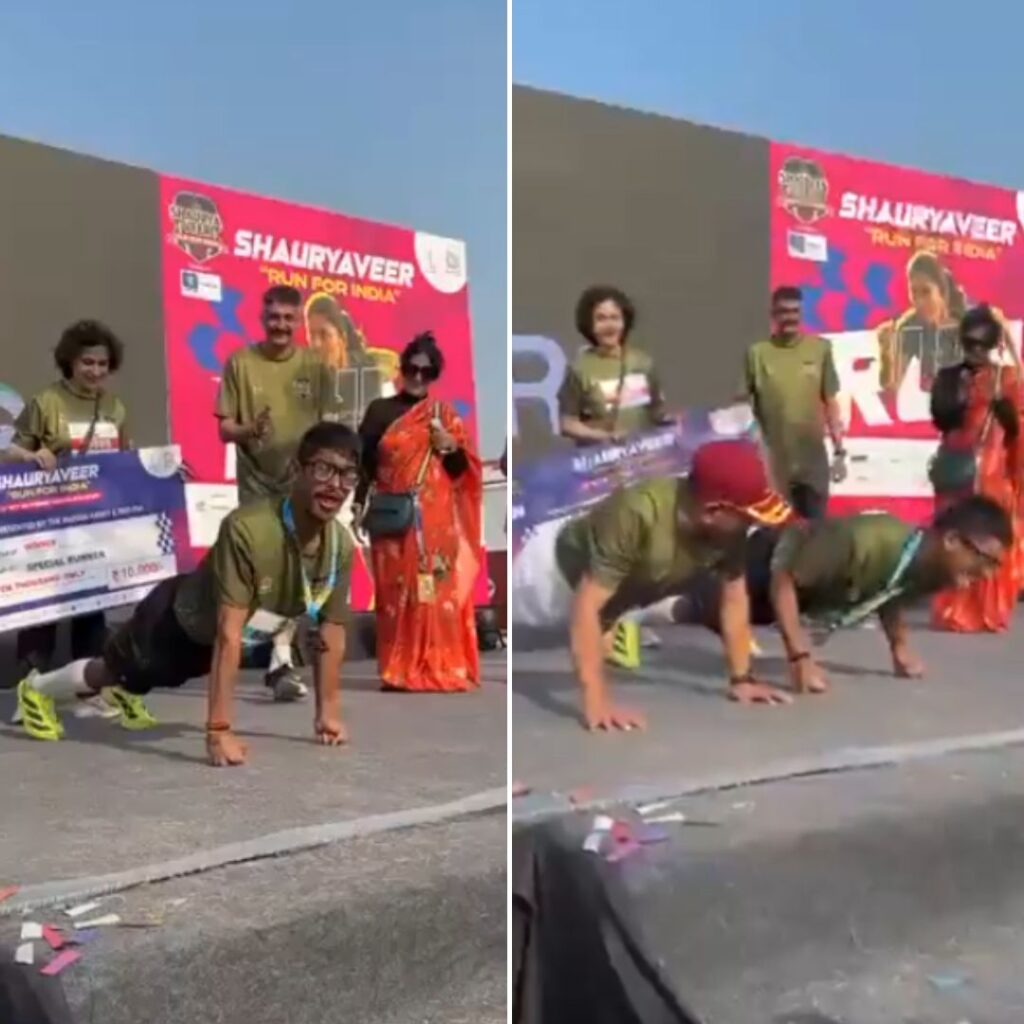“You aren’t alone. The Goddess will look after you. She won’t leave your side. You need nothing else.”
“No one else…”
There was a silence. In memories that recurred, in words that quivered. Shobha gazed at the patches of brown that had lost their colour. They were whittled down over time. On the floor, she sat with Radha in her arms.
The door was left ajar. Her eyes traced the afternoon light. Its uncertain rays flit past the walls. Where the shelves held clothes, utensils, and toys; the hall shared its space with the kitchen. Everything found a place here. Beneath ledges, against corners where the walls crumbled, and in rooms that had no windows. And, they all lived together: them and their belongings.
In shared spaces…
Rocking back and forth, Shobha hummed lightly. We didn’t speak for a while. It wasn’t discerning: these moments. Nor was it compelling. But it was there.
Some silences can’t be broken.
“No one wants to marry a Devadasi,” she said staring blankly at the floor. “The practice may have stopped. But it won’t leave us. Not for a very long time. The superstition still persists. If you marry a Devadasi, you will be cursed for the rest of your life. Your village will suffer. Your crops will rot.”
Death. That’s what they fear the most. Educated men who live in the cities refuse to marry girls from Hire Shindogi, she said. For, they’d be cursed. But the younger girls still have a chance. “They can fall in love and find their partners. We don’t allow children to get married. Early pregnancies can be extremely fatal. There have been cases of girls getting pregnant as soon as they hit puberty. Many don’t survive.”
The older Devadasis will never find anyone. They’ll be alone for the rest of their lives. Some have children. But their partners don’t want them. “Other men don’t wish to marry ‘such’ women. Who would marry a 25-year-old Devadasi with children? Even if they agree, the villagers discourage them from pursuing an alliance. It will bring drought; they tell the family. ‘You will get married and go away. But what about our problems. What about the misfortunes it will bring us? Aren’t you worried about the village?”
“Sometimes, they say things,” she paused reluctantly.
“Not everyone. Just a few from the upper caste.”
“What do they say?”
“They pass lewd remarks.”
“They are Lingayat. So, they believe they are entitled to speak to us that way,” she said straightening her arms.
Outside, children gathered at the porch.
Curiously, they inched closer to the door, one by one.
“Will you sleep with me? I have money. I will reward you well,” said Shobha craning her neck to see past the children.
“That’s what they’d tell us…”
“Men will pay you Rs 500,” she said wiggling her toes, “For your time. In return, you will lead a life of agony and despair. Many get diseases. Some even life threatening. That’s the worst part of being a Devadasi.”
The door creaked open. Shobha sat upright and gestured two women to join us. Meenakshi sat beside her. They were friends. We could tell. She walked with a limp. An old woman took long strides into the hall. She sat on the ground beside the door. Her face was hard, almost impossible to read. She looked at us for a while, saying nothing. Sometimes, her features contorted into a frown every time the women spoke.
She agreed with them. May be.
Perhaps, that was the only reason.
A screeching noise from outside startled her. She looked back frightened at children prancing around with sticks and stones. They were walking too fast. Some poked their heads inside. Her veil fell to her shoulder. Shooing them away, she ran her palms over her saree. Its coarse threads struck her fingers.
“Her name is Uligamma,” said Shobha pulling her aside with a warm smile. “She has four children. She did everything she could to survive. To keep her children alive. She didn’t have any land of her own. Her struggles can’t be measured.”
“Where’s the father?”
“There are different fathers. They don’t belong to her caste.”
“Our caste,” explained Meenakshi.
She doesn’t remember how long ago the practice began. Nobody remembers. It existed before she was born. Uligamma had six brothers and sisters. Three of them died young. She and her sister were dedicated when they were little. They carried forth the tradition with their daughters too. “I didn’t have a choice. None of us did. I used to work as a coolie to feed my children. I am not sure why it thrived here. The Devadasi tradition. Some say it was decided by our ancestors. Some say it’s God’s will. Who am I to question any of this?” she explained cupping her chin with her hands.
“Some days, I did,” she whispered looking around, gauging our reaction.
“If I were ill, my husband would have rushed me to the hospital. But I don’t have a husband now, do I? I had no one. If we weren’t Devadasis, our family would take care of us. Whenever I worked with other coolies, I’d see them eating with their husbands,” she said with regret. There wasn’t any anger left in her. But something spiralled into her voice, that day. It rose in swirls, and faded away. But it never left her.
We couldn’t tell what it was.
“I’d wonder why was I dedicated? Why did we become like this? I’d ask God these questions. The married women would go home and rest. Their husbands would take them out. I never rested. Not for a day. I toiled hard day and night. Who else will feed my children? Why did she choose us? Why was I born this way?”
“Yes, I questioned her, some days. The Goddess. Even though it wasn’t my place to do so…”
“Nothing ever was. I have no place here. Not amongst humans, not amongst Gods.”
There it was again; that steady build which rose in tandem. Occasionally, between the untraceable and forgotten, when memories strung the past and reclined into present, in strained silences, it rustled through her voice. Over and over again.
Helplessness.
We wondered aloud if their economic downfall perpetuated the tradition for generations to come. Whether people believed they’d incur unprecedented losses with women leaving their household; whether it foiled their plans to survive if they were to partake in conventional societal norms.
“No. This was an ancestral tradition that was passed on from one generation to the next. It had nothing to do with the state of the household. Women got married in that era. They had a husband, and a family to support them. We could have everything that any other girl would have, save choice. That wasn’t ours to make.”
“Did the rich dedicate their girls?” we asked her.
“Rich,” she exclaimed perplexed. A wide grin crossed her face as she said, “Nobody was rich. The Dalit community did whatever they could to survive.”
“But life is better now.”
“How?”
“We didn’t have any food back then. We had to work all the time. We were always hungry. And, there was nothing to eat. Sometimes, we had to do things that wouldn’t please us, that wouldn’t give us happiness. Now, it’s better. My kids are educated, and they earn for themselves. They dropped out of high school early. At least, they could go to school. That makes me happy.”
“I don’t recall memories from the past anymore.”
“Do they bring you pain?”
She didn’t answer.
“These memories…”
She didn’t answer.
There were many questions that went unanswered, that afternoon. A few didn’t have any. Many tales were left untold. We didn’t prod.
Some answers were better not sought.
“Was it a lonely life?”
With a grimace, she turned away from us . Her smirk didn’t go unnoticed. Wiping her forehead, she heaved a sigh. Her feet hurt, she said. On some days, the blisters made it difficult to walk.
“I am a Devadasi. I was always alone..”
“It was my responsibility to take care of everything. And, everyone,” she whispered harshly, “Anywhere, I go I will be alone. There will never be a jodi in my life.”
“Loneliness is all I had.”
“And, all I’ll ever have…”
She gets Rs 400 per month as pension. Installments are collected every quarter. Although the Devadasi Rehabilitation Programme hoped to enable older women to lead a life of human dignity, and aid in their survival; the reality often falls far short.
“They have to pay Rs 3,000 as bribe in order to avail their pension. Every three months, they beg the authorities to release their money. Devadasis who are physically-challenged receive Rs 900 to Rs 1,200 per month. We have complained to the saars on numerous occasions. It is pointless. They have to pay them a part of their compensation. Only then will they get their money. Bribery is the only solution to our problem. So, we gave up. We don’t have any support,” said Shobha.
A few months later, it was demanded to allot some agricultural land to selected Devadasis. Their pension was to be raised.
Nothing happened. There was some noise for a while, claimed the women. But like most demands, this too was forgotten. And, everything fell silent soon enough.
Purohits don’t identify girls anymore. Nor do the villagers. Everybody discourages the practice. They recognise the brutality of the tradition. It was different, earlier; they all said.
Sometimes when the priests walked past their homes, they’d remark in disgust: This is where the Devadasis live. These are the Devadasis.
“Look at these women…”
Caste-based discrimination thrives in these alleys. It always has for centuries. Dalits are forbidden from setting foot into temples meant for the upper caste. Shobha’s stern look didn’t go amiss. She loosened her grip on her knees, and rubbed her palms together.
“Yes, it exists,” she said, “Everything we do boils down to our caste. Nobody escapes discrimination. Lingayats refuse to talk to us, at times. They don’t even entertain us in their homes. At tea stalls, there are separate utensils and tumblers meant for Dalits. The barber doesn’t touch our hair. It will make his hands impure. And, he will lose all his Lingayat customers. We travel all the way to Koppal to get our hair cut. This is how it was. This is how it will be. Unless, we fight for our rights; our right to live, right to eat and right to clean water, right to be treated as human beings, nothing will change.”
The government allotted them land, and built a colony of houses for some families since the village was getting too crowded. So, they all moved here. Invisible sections were drawn lest the impure pollute their homes. Soon, the upper caste occupied one end, and the Dalits another.
“There wasn’t enough place for all of us. At least, that’s what we were told,” said Shobha and Meenakshi bursting into a fit of giggles.
As the day went forth, we spoke of the 30 girls who dropped out of schools, and had no means of earning their livelihood. They had no land, and income was meagre. With impending drought-like conditions, those who worked in farmlands as labourers would soon lose their jobs.
It was afternoon, and the village looked deserted. Soon, Savitha entered the house. She covered her mouth with a shawl, and smiled at everyone. Her salwar hung loosely over her petite frame. Shobha asked her to sit beside us. They conversed for a while about home. We didn’t know where she lived. We never asked her.
“She left school a few years ago. For almost two years, she sat at home,” said Shobha chiding her with a smile, “We forced her to study. All of us — Devadasis — who couldn’t afford to go to college saw hope in her. We refused to let her throw it away. So, we gathered everyone, one day, and walked into her home. We told her that she had to earn a degree, and that she had no say in it whatsoever. What would she do sitting at home? She did very well in school. She is now in her final year. Since no one from our village could reach thus far, we thought why not help someone who could? May be it could be a start.”
In villages all across, everywhere flowers withered and blossomed over time. Not in Hire Shindogi. Here, there were no flowers. There was no garden. Just lanes with a beginning and an end.
Every path had a story. And, everybody told one.
Some had no beginnings.
But they all had an end, one way or another.
First part of the story: My Story: If The Girls Weren’t Dedicated To The Goddess, Tragedy Would Befall The Families And The Village
This story is an effort by The Logical Indian in collaboration with Rest Of My Family towards bringing stories which need much attention.
Submitted By Akshatha Shetty & Photos By Piyush Goswami
















